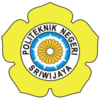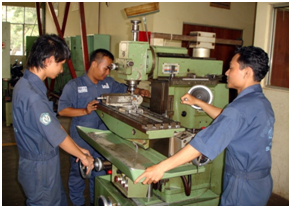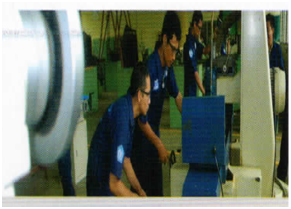Introduction
Mechanical Engineering Department (MED) was established in 1982 based on Ministry of Education and Culture of Republic Indonesia decree No.03/DJ/Kep/1979 at the same time with six other Polytechnics in Java and Sumatra. Mechanical Engineering Department (PSTM) currently has 3 concentrations, maintenance and repair, production engineering, and heavy equipment. Up to 14th September 2013, 29th Polsri Graduation Ceremony, PSTM has already inaugurated 1535 Maintenance & Repair alumni, 1270 Production Engineering alumni, and 66 heavy Equipment alumni. PSTM has 41 teaching staff: S1 Degree (7), and master degree (34)-overseas (3) and domestic (31). Beside that at this time being one of the staff is completing doctoral study abroad (Taiwan). Mechanical Engineering Study Program ( PSTM ) has representative facilities such as Mechanics Workshop and Maintenance and Repair Workshop (1323 m2), Mechanics and CNC Laboratories (867 m2) Multimedia Laboratory (66 m2), and Design Laboratory (100 m2). Accreditation: B based on BAN – PT certificate No.: 008/BAN-PT/Ak-IX/Dpl-III/VI/2009.
Vision
Toward a recognized center of education and professional training in the field of Mechanical Engineering regionally and nationally.
Mission
- Providing facilities and infrastructureforsupportingeffectiveandefficientlearning processbased onstakeholders’ demand;
- Improving knowledgeandskills of human resourcesin line with competenciesto be achieved;
- Monitoring andcontrollingallsectorquality;
- Developinganddisseminatingappliedscienceandtechnologythroughresearchandcertifiedtraining, provide services-service and productionin ProductionEngineeringandMaintenance/RepairofIndustrialMachineryandheavy Equipment;
- Developing Mechanical EngineeringDepartment toward aquality-oriented, professional, open, and competitive department.
Purposes
- To produce mid-level managers and professionals that are able to apply science and technology in production process and maintenance of industrial machinery and heavy equipment;
- To play a role in improving people’s lives through research and community service.
Targets
- At least 75% of graduates’GPA ³00(scale 04) in each academic year;
- At least 50% of graduates’waiting periodtoget ajobfirst £6months;
- At least80% of alumnihaveonecertificate ofcompetency;
- At least 50% of AlumnihaveTOEIC score³350
Strategies to Achieve Targets
Strategies for Achieving 1st Target
- Design and prepare learning materials and activities based on stakeholders’ demand (100 % of the RAP , SAP and AP);
- Monitor and control learning process (the average learning hour is ≥ 95 % of the scheduled learning hour and the average of student attendance is ³ 95 % of scheduled attendance);
- Improve methods and instructional media (100% of the total number of learning contract).
Strategies for Achieving 2nd Target
- Initiate partnership with industry and maintain communication links with alumni who have or have not gotten jobs yet;
- Organize seminars/training and invite speakers from the industry/stakeholder for prospective graduates about work ethic and the ins and outs of industry and job.
Strategy For Achieving 3rd Target
Conduct training and competency testing in the fields of production, maintenance/repair and heavy equipment.
Strategies For Achieving 4th Target
- Cooperate with other parties in developing English learning program which is suitable with industrial/job market demand;
- Conduct a TOEIC test for English subject semester test.
Graduates’ Profile
Mechanical Engineering graduates have the ability to be innovative spirit Foreman/Supervisor in developing production engineering and maintenance/repair of industrial machinery and heavy equipment techniques, have entrepreneurial spirit, preserve environment and ready to face global competition.
Learning Outcomes
- Master basics of manufacturing/production, maintenance/repair of industrial machinery and heavy equipment;
- Able to carry out work and formulate solution for procedural problems by using appropriate skills in manufacturing/production, maintenance / repair of industrial machinery and heavy equipment, and able to work in team;
- Able to choose standard or non standard method in carrying out production process, maintain industrial machinery and heavy equipment;
- Able to communicate with team work in completing job and is able to write work report;
- Able to act and behave in society and in line with workplace career norms;
- Able to follow development of science, technology, and / art in the field of production engineering, industrial machinery and heavy equipment.
Graduates’ Competences
- Production Engineering Concentration
Core Competencies - Able to carry out simple and routine production tasks based on predefined work procedures;
- Have knowledge about how to operate production machine and tool so that appropriate problem solving in production techniques can be done;
- Able to carry out qualified and measurable specific manufacturing tasks under his/her superior’ direct guidance;
- Master basic knowledge of certain skills and apply it for related problems;
- Able to complete various forms of specific tasks based on a number of working procedure options for independent production of qualified, efficient and measurable product;
- Able to complete general manufacturing work, based on a number of working procedure options for sustainable production of qualified, efficient and measurable product..
Supporting Competences
- Master basic science of engineering;
- Master health and safety procedures at work and ways to keep environment safe and healthy;
- Able to manage human resources (selecting, placing , motivating and evaluating);
- Able to communicate in Indonesian , English and others (oral and written);
- Master various computer application programs and information technology.
Other Competence
Honesty, responsibility and good morale, as well as religious and nation’s values.
Cooperation Classes
Cooperate with government or private companies/institutions in opening Diploma Program III cooperation classes for Production Engineering/Manufacturing, Engineering, Maintenance & Repair of Industrial Machinery and heavy equipment.
Training Service
Provide training in Production Engineering (Gas /Electric welding, Lathe operation, Milling, Grinding), Mechanical Lab. (Tensile Test, Hardness, Metallografy, Metrology, & Heat treatments) and Production Automation (CNC Milling and CNC Turning).
Production and Consultation Services
Provide Production Services in producing simple machine components, Tensile test, Hardness test, Maintenance & Repair Management consultation and design consultation.
Facilities
Facilities which are available in Mechanical Engineering: Mechanics workshop(Lathe, Milling, Grinding, Drilling, Forging, Gas /Electric welding, Shaping, Metal Sheet Cutting Machine, Facilities in Mechanic Lab (Tensile Test, Hardness Test, Metallogarfy, Metrology, Heat Treatment) Facilities in CNC Lab (Turning/Lathe Simulation, Milling simulation, CNC Milling and CNC Turning machine/Lathe)


